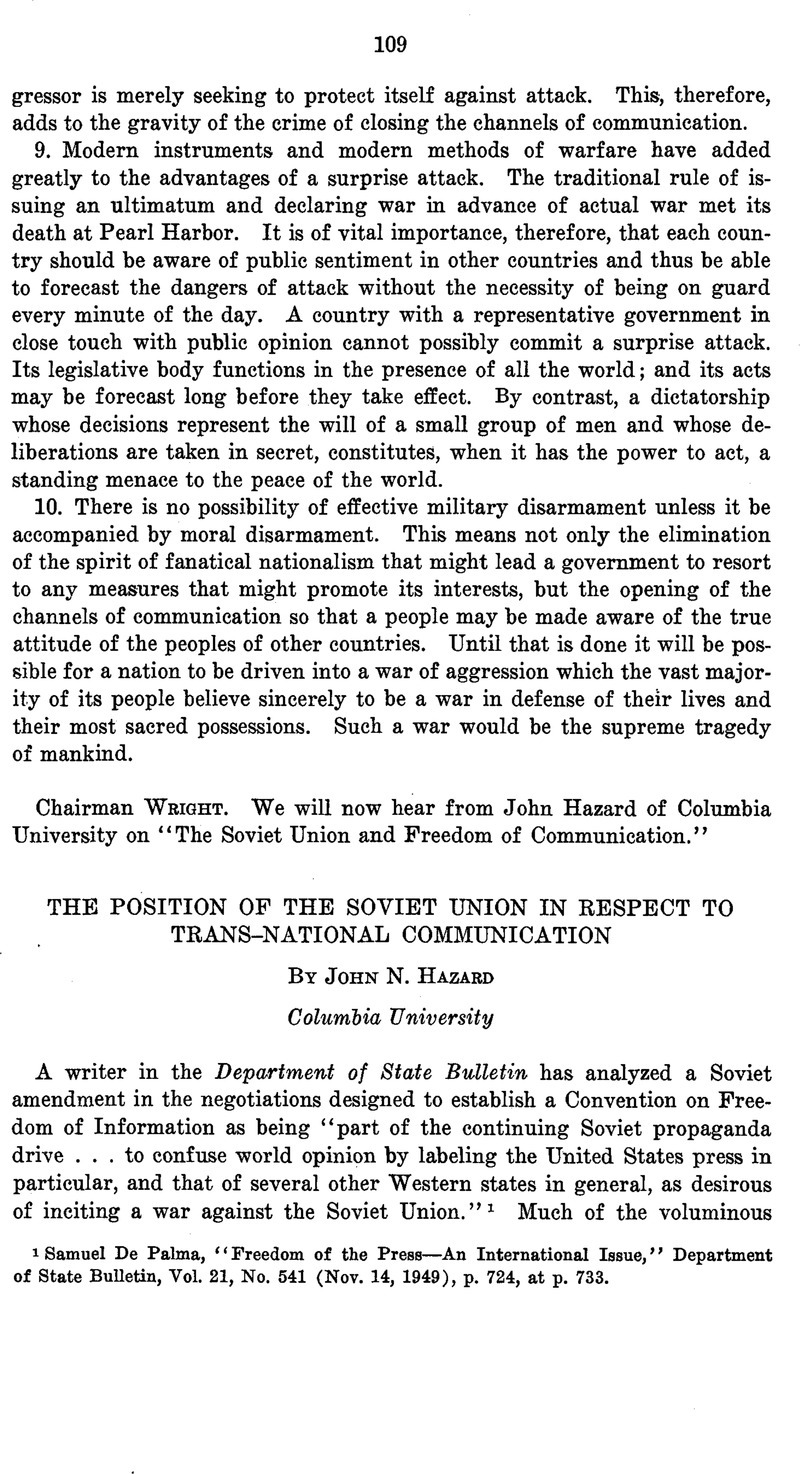No CrossRef data available.
Published online by Cambridge University Press: 27 February 2017

1 Palma, Samuel De , “Freedom of the Press— An International Issue, ” Department of State Bulletin, Vol. 21, No. 541 (Nov. 14, 1950), p. 724, at p. 733Google Scholar.
2 This Soviet argument is developed most succinctly in I. Lapitsky, “International Conference on Freedom of Information,” New Times, No. 20, May 12, 1948, p. 10.
3 The Soviet proposal, in corrected form, is found in U.N. Doc. E/CONF.6/C.11.4/Corr. 1, March 31, 1948. U.N. Conference on Freedom of Information. The United States proposal is in E/CONF.6/C.1/1, March 23, 1948.
4 E/CONF.6/BUE/SE.1, March 23, 1948. First Meeting o f General Committee, U.N. Conference on Freedom of Information. The agenda referred to is in E/CONF.6/1, Aug. 22, 1947.
5 E/CONF.6/C.1/4, March 31, 1948. Committee I, XJ.N. Conference on Freedom of Information.
6 Idem.
7 Press Release SOC/151, May 27, 1947, U.N. Press Division. Meeting of the Human Eights Commission—Subcommission on Freedom ofInformation and the Press.
8 Press Release SOC/147, May 23, 1947, U.N. Press Division. Meeting of Human Bights Commission—Subcommission on Freedom o f Information and the Press. The Summary Record of the meeting gives this as “ He repeated that every government had the right to conduct its affairs in accordance with existing laws.” E/CN.4/Sub.l/SR.9,May 27, 1947.
9 E/CONF.6/C.1/SR.9, March 30, 1948, p. 3. U.N. Conference on Freedom of Information.
10 I. D. Levin, The Question of the Substance and Meaning of the Principle of Sovereignty (in Eussian), Sovetskoe Gosudarstvo I Pravo, No. 6 (1949), p. 32 at p. 38.
11 Statement and Proposals Presented to the Subcommittee by Mr. J. M. Lomakin, E/CN.4/Sub.l/54, Jan. 26, 1948.
12 “The press had an important part to play in the fight against war mongers. Freedom of expression was justified only insofar as it did not hamper that fight.” J. M. Lomakin, in E/CN.4/Sub.l/SB.30, Jan. 28, 1948, p. 4. Commission on Human Eights, Subcommission on Freedom of Information.
13 E/CN.4/Sub.l/SK.47, Feb. 9, 1948, p. 8. Commission on Human Eights, Subcommission on Freedom of Information.
14 E/CN.4/Sub.l/SE 54, Jan. 26, 1948, p. 10.
15 For Mr. McNeil's views, see E/CONF.6/C.1/SE 6, March 29, 1948, p. 5. U.N. Conference on Freedom of Information.
16 Document cited supra, note 14.
17 For decree o f June 6, 1931, on Censorship, see SOB. UZAK, RSFSR, 1931, No. 31, Art. 273.
18 E/CONF.6/C.4/SR/9, April 7, 1948, p. 4. Committee IV of U.N. Conference on Freedom of Information.
19 E/CONF.6/C.4/SR/8, April 6, 1948, p. 10. Committee IV of U.N. Conference on Freedom of Information.
20 E/CONF.6/C.4/SR.12, April 8, 1948, p. 4.Committee IV of U.N. Conference on Freedom o f Information.
21 Document cited supra, note 11, p. 1.
22 E/CN.4/Sub.l/SE.30, Jan. 28, 1948, p. 4. Commission on Human Eights, Subcommission on Freedom of Information.
23 Press Eelease GA/445, March 28, 1949, p. 3. U.N. Department o f Public Information, Background Eelease.
24 For full text o f the General Assembly Eesolution, see E/CN.4/Sub.l/38, Jan. 12, 1948, p. 30. Discussion o f the Concept o f Freedom of Information in Organs of the United Nations.
25 E/CN.4/Sub.l/SE.45, p. 8.
26 See Grazhdanskoe Pravo, Vol. I I (Moscow, 1938), p. 392, and M. Y. Zimeleva et al., Grazhdanskoe Pravo (Moscow, 1947), p. 360.